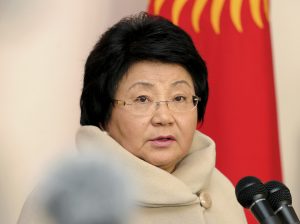Last week, United Nations Secretary-General Antonio Guterres announced his appointment of Roza Otunbayeva as the new Special Representative for Afghanistan and head of the United Nations Assistance Mission in Afghanistan (UNAMA). She follows Canadian diplomat, Deborah Lyons, who served in the position from March 2020 to June 2022.
The choice of Otunbayeva reflects the UN’s ongoing concern about the rights of women and girls in Afghanistan.
Otunbayeva has the distinction of being Central Asia’s only female president and one of the few Central Asian leaders to ever step down. Otunbayeva served as interim president following the 2010 revolution and did not seek to skirt rules barring her from running for president in 2011. She served as Kyrgyzstan’s first ambassador to the United States in the early 1990s, then as Foreign Minister, and then as ambassador to the United Kingdom. In the early 2000s, she was appointed Deputy Special Representative of the UN Secretary-General in the Peacekeeping Mission for Georgia. In 2004, she returned to Kyrgyzstan and politics, which entered an extended phase of upheaval with the 2005 Tulip Revolution ousting President Askar Akayev and later the 2010 revolution overthrowing Kurmanbek Bakiyev.
Following her interim presidency in 2010-2011, Otunbayeva largely receded from engaging in direct politics in Kyrgyzstan. She established a foundation in her own name — the Roza Otunbayeva Initiative — focused on youth development, democratic governance and “unity in diversity.”
As head of UNAMA, Otunbayeva will have the difficult task of managing the U.N.’s efforts to aid Afghanistan.
In a briefing for the U.N. Security Council last week, U.N. humanitarian chief Martin Griffiths said that nearly 19 million people in Afghanistan are facing acute levels of food insecurity, with 6 million at risk of famine. Griffiths noted that large-scale development assistance has been halted for over a year now, following the Taliban’s takeover of Kabul in August 2021, and said that the operating environment remains tremendously difficult to navigate.
Subsequent remarks were delivered by Markus Potzel, who was appointed Deputy Special Representative (Political) for Afghanistan this past June but has been serving as acting head of UNAMA. Potzel concluded that “It is vital to move beyond an exchange of hardened positions towards a sustained dialogue between the Taliban, other Afghan stakeholders, the wider region and the international community.” He noted, however, that the Taliban’s reluctance to adhere to international norms “regarding human rights, especially those of women and girls; representative governance; and international collective security” were a major impediment to engagement. Potzel also noted that “Donors have repeatedly stated that the resumption of economic cooperation hinges primarily on Taliban action to reverse regressive policies.”
As Otunbayeva takes up leadership of UNAMA, the rights of women and girls in Afghanistan will remain a central concern. Taliban intransigence on this issue is actively impeding assistance in other realms and delaying diplomatic progress.
On September 3, Guterres tweeted, “Girls belong in school.” He noted that “Girls in Afghanistan continue to be locked out of the classroom” and that “[t]his is an unjustifiable violation of equal rights that damages the entire country.”
































